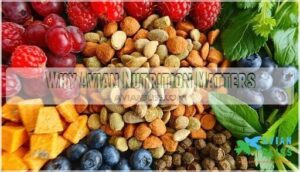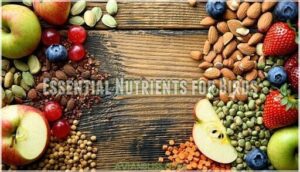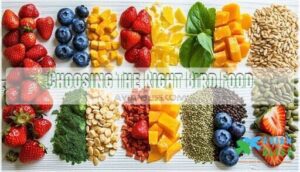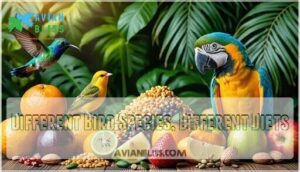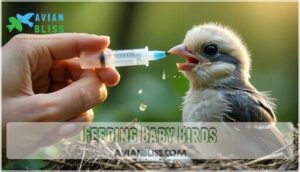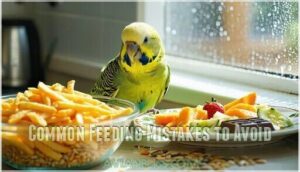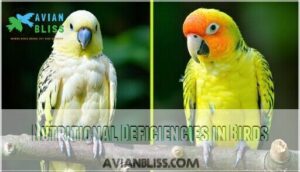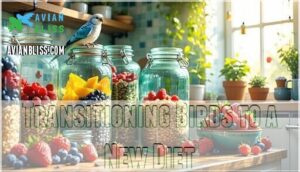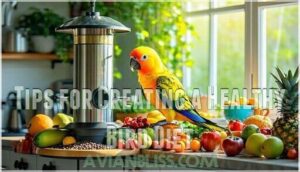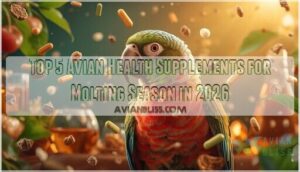This site is supported by our readers. We may earn a commission, at no cost to you, if you purchase through links.
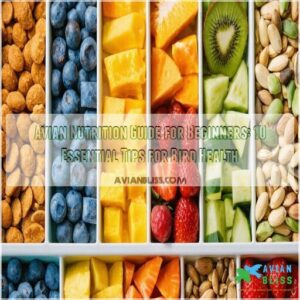
Your feathered friend needs a balanced diet of quality pellets (40-60%), fresh vegetables and fruits (20-30%), and seeds as treats (10-20%).
Always provide clean water daily.
Different species have unique requirements—parakeets don’t eat like macaws!
Start with researching your specific bird’s needs.
Watch for bright feathers and active behavior as signs of good nutrition.
Remember, seeds alone won’t cut it—they’re like bird fast food.
A proper avian nutrition guide for beginners focuses on variety and balance.
Those colorful food dishes aren’t just for looks—they help birds identify new foods.
Table Of Contents
- Key Takeaways
- Why Avian Nutrition Matters
- Bird Digestive System Basics
- Essential Nutrients for Birds
- Choosing The Right Bird Food
- Different Bird Species, Different Diets
- Feeding Baby Birds
- Common Feeding Mistakes to Avoid
- Nutritional Deficiencies in Birds
- Transitioning Birds to a New Diet
- Tips for Creating a Healthy Bird Diet
- Frequently Asked Questions (FAQs)
- Do avians need a balanced diet?
- What food should an anemic person eat?
- What vitamins do avians need?
- How much protein should a granivorous avian eat?
- What should a granivorous avian eat?
- What is a good diet for birds?
- What is the ideal avian diet?
- What is the most critical nutrient to birds?
- What is the healthiest food for birds?
- What should a bird’s diet look like?
- Conclusion
Key Takeaways
- You’ll need to provide a balanced diet with quality pellets (40-60%), fresh fruits and vegetables (20-30%), and limited seeds (10-20%) rather than relying on seeds alone, which act like fast food for birds.
- You should tailor your bird’s nutrition to their specific species, as different birds have unique dietary requirements—parakeets don’t eat like macaws and carnivorous birds need different nutrients than herbivorous ones.
- You’ll see bright feathers, consistent energy levels, and proper weight as indicators of good nutrition, while dull plumage, lethargy, and weight changes signal potential nutritional deficiencies.
- You must transition your bird to new foods gradually over several weeks, as sudden diet changes can cause digestive issues—be patient and persistent when introducing healthier options to your feathered friend.
Why Avian Nutrition Matters
You’ll directly impact your bird’s health, behavior, and lifespan with every food choice you make.
Proper nutrition supports everything from vibrant feathers and strong bones to natural behaviors and peak immune function.
While poor diet choices can lead to serious health issues within months, affecting your bird’s overall health.
The Role of Nutrition in Bird Health
Your bird’s health foundation rests squarely on proper nutrition. What you feed your feathered companion directly impacts their overall well-being, from inside out.
A balanced diet supports your bird’s immune system, maintains vibrant feather quality, and guarantees proper organ function.
When birds receive the best possible nutrition, you’ll notice:
- Stronger bones and skeletal structure, preventing fractures and deformities
- Consistent energy levels throughout the day, encouraging natural behaviors
- Enhanced resistance to common avian illnesses and infections
- Brighter, more colorful plumage that molts properly and regrows healthy
Birds can’t tell you when their nutritional needs aren’t being met. It’s up to you to provide a complete diet that includes all essential nutrients. Without proper nutrition, birds often develop silent health issues before visible symptoms appear.
The avian nutrition guide you follow today will determine your bird’s health tomorrow.
How Nutrition Affects Behavior and Development
Just as human diets affect our energy and mood, your bird’s nutrition directly shapes its behavior and development.
Early nutrition impacts cognitive development and can prevent feather pecking behaviors.
| Nutritional Factor | Behavioral Impact | Development Effect |
|---|---|---|
| Protein levels | Reduces aggression | Supports muscle growth |
| Vitamin deficiency | Increases lethargy | Slows growth rate |
| Omega fatty acids | Improves mood | Enhances brain function |
| Calcium balance | Decreases anxiety | Strengthens bone structure |
Proper avian nutrition reduces stress and improves breeding success in adult birds.
Importance of Nutrition for Bird Longevity
While good nutrition shapes your bird’s behavior, it’s also the foundation for a longer, healthier life. Just like humans, birds thrive when their dietary needs are met consistently.
The connection between diet and lifespan is straightforward – birds with ideal nutrition simply live longer.
Here’s why proper avian nutrition matters for longevity:
- A balanced diet strengthens your bird’s immune system, helping prevent diseases before they start
- Regular intake of essential vitamins supports healthy organ function throughout their life
- Proper weight management through controlled feeding reduces strain on their heart and joints
- Consistent hydration and fiber intake maintains digestive health, preventing painful impactions
- Antioxidant-rich foods help combat aging at the cellular level, supporting healthy aging
With the right avian diet approach, you’re not just feeding your bird – you’re building additional years of companionship and joy. Proper avian nutrition matters for longevity, and a well-planned diet can add years to your bird’s life, providing a longer, healthier life.
Bird Digestive System Basics
Your bird’s digestive system works differently than yours, with special parts like the crop for storing food and the gizzard that grinds it using tiny stones.
Understanding how your feathered friend processes nutrients will help you make better feeding choices that support their unique digestive needs, based on their digestive system.
The Anatomy of a Bird’s Digestive System
Inside your feathered friend’s body lies a remarkable digestive system designed for efficiency.
The crop, a stretchy pouch, temporarily stores food before processing.
Next, the gizzard uses small stones to grind food, compensating for the lack of teeth.
Long, coiled intestines then extract nutrients through rapid absorption.
This avian physiology varies slightly between species, allowing birds to process different diets at impressive speeds.
Understanding this system helps you tailor nutrition and spot potential digestive disorders early through fecal analyses and behavior changes.
Birds also possess unique lung characteristics for efficient respiration, which is a key aspect of their overall avian physiology.
How Birds Process Food
With bird digestive anatomy behind us, let’s see this remarkable system in action.
Unlike mammals, birds process food with incredible efficiency. Food first enters the crop, where it’s moistened and stored temporarily.
Next, the gizzard—using small stones your bird has swallowed—grinds food into digestible paste.
The intestines quickly extract nutrients before waste is expelled. This rapid metabolism supports their high energy needs.
Understanding this avian physiology helps you recognize signs of proper digestion or potential digestive disorders that might require fecal analyses.
Essential Nutrients for Birds
You’ll need to provide your bird with proteins, fats, carbohydrates, vitamins, minerals, and fresh water to support their health and vitality.
Just like your own body needs fuel to function properly, your feathered friend requires these six essential nutrients in the right balance for ideal growth, energy, and immune system strength.
Macronutrients: Proteins, Carbohydrates, and Fats
Your bird’s health depends on three essential macronutrients: proteins, carbohydrates, and fats.
Proteins (12-30% of diet) repair tissues and support feather growth. Carbohydrates (20-50%) provide energy for daily activities, while fats (2-20%) help absorb vitamins and store energy.
Proper macronutrient ratios create energy balance in your avian diet. Most birds thrive when pellets form the foundation, supplemented with appropriate protein sources, carb types, and healthy fats.
Remember, each species has unique dietary needs.
Micronutrients: Vitamins and Minerals
While proteins, carbs, and fats provide energy, micronutrients work behind the scenes for your bird’s health.
Your feathered friend needs specific vitamins and minerals for peak functioning:
- Vitamin A supports vision and immune strength
- Vitamin D3 helps calcium absorption for sturdy bones
- Vitamin E acts as an antioxidant protecting cells
- Calcium prevents metabolic bone disease
- Phosphorus works with calcium for proper egg formation
Colorful fruits and veggies naturally deliver these nutrients, while quality pellets guarantee balanced intake. Remember, overdoing supplements can create toxicity risks.
Water: The Most Vital Nutrient for Birds
Water flows through every aspect of your bird’s health as the foundation of their survival and wellbeing. You’ll need to provide fresh, clean water daily, as proper hydration directly impacts digestion, temperature regulation, and overall vitality.
Birds require consistent access to water that’s free of contaminants to maintain healthy health. Check your bird’s water supply regularly, as even a day without proper hydration can be dangerous.
To guarantee proper hydration, consider using bamboo bird dishes for an eco-friendly option.
- Water quality matters—use filtered or bottled water if your tap water contains high mineral content
- Hydration methods vary by species—some prefer shallow dishes while others need specialized bottles
- Bathing needs differ—provide appropriate bathing options based on your bird’s natural habits
- Deficiency signs include lethargy, dry skin, and concentrated droppings
Choosing The Right Bird Food
You’ll need to balance commercial foods like pellets, seeds, and mixes with fresh fruits and vegetables for your bird’s best health.
The right combination provides essential nutrients while preventing deficiencies that can affect your feathered friend’s energy, plumage, and overall wellness.
Commercial Bird Food: Pellets, Seeds, and Mixes
After understanding your bird’s nutritional needs, you’ll need to navigate the sphere of commercial bird food.
At pet stores, you’ll find three main options: pellets, seeds, and mixes.
Pellets offer complete nutritional value with balanced vitamins and minerals—veterinarians recommend these for 70-80% of your bird’s diet.
Seeds (like millet and sunflower) are tasty but nutritionally incomplete, best limited to 5-25% of their intake.
Quality mixes like Nutriberries combine the appeal of seeds with better nutrition.
Many owners choose to buy specialized bird pellets for their pets.
For ideal health, consider organic bird food options or fortified food alternatives that match your feathered friend’s specific dietary requirements.
Importance of a Balanced Diet
Every bird thrives on a balanced diet that includes the right nutrient ratios for peak health.
Your avian companion needs variety—not just one type of food.
Aim for high-quality pellets (50-70% of their intake) as the foundation of their avian dietary needs.
Supplement with appropriate amounts of seeds, nuts, and whole grains for energy.
Portion control prevents obesity while ensuring they get essential nutrients.
Many nutritional deficiencies in birds stem from imbalanced feeding practices.
Think of your healthy bird diet as a daily prescription for longevity.
Consistent, balanced nutrition supports immune function, feather quality, and natural behaviors.
This avian nutrition guide principle is non-negotiable for responsible bird care.
It emphasizes the importance of a well-planned diet for the overall health and well-being of birds, making daily nutrition a critical aspect of their care.
Supplementing With Fresh Fruits and Vegetables
While pellets provide a foundation, your bird’s menu needs fresh fruits and vegetables for complete nutrition.
These colorful foods should make up 20-25% of their daily diet.
- Choose wisely from the safe produce list – leafy greens, carrots, bell peppers, berries, and apples (minus seeds) top the chart
- Wash thoroughly to remove pesticides or opt for organic when possible
- Prepare properly by chopping into appropriate sizes for your bird’s species
Reorganizing your bird’s diet to include these elements will provide a complete nutrition plan, ensuring they receive all necessary nutrients for optimal health.
Different Bird Species, Different Diets
You’ll need to match your bird’s diet to its specific biological needs, as parrots require different nutrients than finches or canaries.
Just as you wouldn’t feed steak to a rabbit, each bird species has evolved unique digestive systems that process proteins, fats, and carbohydrates in different ways.
Carnivorous, Herbivorous, and Omnivorous Birds
Now that you’ve selected quality bird food, let’s look at how your bird’s biological design influences their dietary needs.
Your bird falls into one of three dietary categories, each requiring specific nutritional attention.
| Bird Type | Diet Composition | Examples | Key Needs |
|---|---|---|---|
| Carnivorous | 70-100% animal matter | Hawks, owls | High protein, vitamin A |
| Herbivorous | 70-100% plant matter | Parakeets, some parrots | Fiber, varied vegetation |
| Omnivorous | Mix of both | Cockatiels, canaries | Balanced mixed diet |
Wild birds adjust their Dietary Adaptations seasonally, switching between insects in summer and seeds in winter.
Understanding your pet’s natural classification helps you provide the right Nutritional Balance, whether they need Prey Selection, Plant Digestion skills, or Mixed Diets for peak health.
Special Considerations for Specific Species
While different birds have evolved with unique nutritional requirements, you’ll need to tailor your feeding approach to each species’ specific needs.
- Parrots require 10-15% protein diets with plenty of vitamin A from colorful vegetables
- Raptors need whole prey items making up 70-80% of their diet for proper nutrition
- Pheasants thrive on higher protein diets (20-25%) during growth phases
- Ratites digest higher fiber foods with their specialized digestive systems
- Waterfowl need niacin supplementation when fed corn-heavy diets
Your parrot diet should include quality pellets as a base, supplemented with fresh fruits and vegetables. Finch nutrition focuses on small seeds and occasional protein sources. For larger birds like macaws, include nuts but monitor fat intake carefully. Cockatiels need fewer fats than their larger cousins.
Remember that female raptors need extra calcium during breeding seasons, while ducks benefit from foraging opportunities. By matching your feeding plan to your bird’s natural avian diet, you’ll support ideal health.
Feeding Baby Birds
You’ll need to master the precise nutrition requirements of baby birds to guarantee their healthy development, from selecting the right hand-feeding formula to following proper feeding schedules.
Providing proper nutrition during this critical growth stage will help prevent developmental problems and set your young bird up for a lifetime of good health.
The Importance of Proper Nutrition for Young Birds
Three critical stages mark a baby bird’s developmental journey, each with precise nutritional requirements.
| Growth Stage | Energy Needs | Key Nutrients | Impact | Feeding Notes |
|---|---|---|---|---|
| Hatchling (0-2 weeks) | Highest | Protein (22-25%) | Rapid cell division | Every 2-3 hours |
| Fledgling (2-4 weeks) | High | Calcium, Vitamin D | Bone formation | Every 3-4 hours |
| Juvenile (1-3 months) | Moderate | Vitamins A & E | Feather quality | Every 4-6 hours |
| Weaning (3-6 months) | Variable | Varied diet | Immune system | Gradual feeding |
| Sub-adult | Stabilizing | Complete nutrition | Lifelong health | Regular schedule |
Choosing The Right Formula for Hand-feeding
Now that you understand why baby birds need proper nutrition, let’s talk about selecting the right hand-feeding formula.
Four key factors when choosing a formula:
- Species-specific formulas – Different birds have unique dietary needs
- Brand reputation – Harrison’s, Nutribird A21, and Vetafarm Neo-Care are well-regarded options
- Consistency options – From soupy to pea-soup thickness based on chick age
- Temperature control – Always warm formula to 95-106°F before feeding
Many resources are available if you need to purchase bird formula.
Stick with one formula throughout the weaning process to avoid digestive upset.
Feeding Schedules and Quantities for Growing Chicks
Now that you’ve selected a quality formula, let’s talk feeding schedules. Baby birds need consistent meals that match their growth stages.
For newly hatched chicks, offer small amounts every 2 hours (6-10 daily feedings) at 102-106°F. As they develop, gradually decrease to 3-4 daily feedings while increasing portion sizes.
Watch their crops—they should empty between meals. Monitor chick weight regularly to confirm proper development.
Adjust formula thickness as they grow, starting thinner and gradually thickening. Remember, overfeeding can be as harmful as underfeeding, so follow species-specific guidelines for your growing chicks.
Common Feeding Mistakes to Avoid
You’ll find that even well-meaning bird owners can make nutrition mistakes that harm their feathered friends’ health.
These common errors include overrelying on seeds, neglecting fresh water, and offering inappropriate human foods that can lead to serious nutritional imbalances and health problems.
Overfeeding and Obesity in Birds
Many well-meaning bird owners show love through food, accidentally creating pudgy pets.
Obesity in birds leads to serious metabolic issues and shortened lifespans. Watch for a rounded breast or visible fat deposits under wings.
Practice portion control by measuring daily servings and limiting treats to 10% of their diet. Encourage exercise with flight time, climbing toys, and foraging activities.
Regular weight checks help you make necessary diet adjustments. Remember, sometimes the kindest "no" prevents avian obesity.
Feeding The Wrong Foods
While managing your bird’s weight is important, offering inappropriate foods causes equally serious harm.
Feeding the wrong items can lead to nutritional imbalance or toxic reactions.
Common dangerous foods for birds include:
- Chocolate (contains theobromine)
- Avocado (contains persin)
- Salt and high-sodium items
- Caffeine products
- Onions and garlic
Seed dependence often creates malnourished birds despite full dishes.
Birds selectively eat favorites, missing essential nutrients.
Watch for deficiency symptoms like dull feathers or lethargy, and provide safe, species-appropriate alternatives instead.
Neglecting to Provide Fresh Water
Food isn’t the only essential part of bird nutrition—water is equally important.
While focusing on proper diet, many owners forget about water quality. Your bird needs clean, fresh water daily to prevent dehydration risks.
| Water Need | Small Birds | Large Birds |
|---|---|---|
| Daily Amount | 1-2 teaspoons | 1-2 tablespoons |
| Changing Frequency | Twice daily | 2-3 times daily |
| Bowl Type | Shallow dish | Deeper bowl |
Watch for signs like panting or lethargy that indicate your feathered friend isn’t getting enough hydration. Providing water sources, like bird baths, can also support local ecosystems.
Nutritional Deficiencies in Birds
If your bird’s diet isn’t balanced, it can lead to serious health problems like weak bones or dull feathers.
Spotting nutritional deficiencies early is key to keeping your feathered friend happy and thriving.
Physical Symptoms to Watch For
After avoiding common feeding mistakes, it’s essential to recognize the physical signs of nutritional problems in your bird.
Watch for these warning signals of deficiencies:
- Dull, brittle feathers or unusual feather loss
- Sudden weight fluctuations (up or down)
- Beak deformities like overgrowth or softening
- Changes in droppings color, consistency, or frequency
- Swollen eyes, nasal discharge, or breathing difficulties
- Weak legs or lameness
Early detection of these symptoms helps prevent serious health complications in your malnourished bird, which is crucial for its overall well-being.
Behavioral Changes as Indicators of Poor Nutrition
Birds reveal nutritional problems through their behavior long before physical symptoms appear.
Watch for these warning signs:
- Weak tendons causing birds to sit on hocks, developing bald spots
- Decreased preening from pain, leaving feathers bound in their sheaths
- Erratic movements like crashing into cage walls or showing "red tears" when stressed
Activity levels often drop, with less talking, playing or self-grooming.
Appetite changes are telling – refusing new foods or obsessing over unbalanced options like seeds.
These behaviors, alongside changes in droppings, signal potential malnutrition requiring your veterinary healthcare team’s attention; for example, deficiencies can cause feather abnormalities.
When to Consult an Avian Veterinarian
The warning signs of nutritional problems often require professional attention.
When you notice feather abnormalities, sudden weight loss, appetite changes, or unusual lethargy signs, it’s time to consult your avian veterinarian.
Behavioral shifts like aggression or lethargy can indicate serious deficiencies that only blood tests and a physical examination can confirm.
Don’t wait until problems worsen—your veterinary healthcare team can identify nutritional imbalances before they become life-threatening.
Remember, catching these issues early is your bird’s best defense against long-term health complications.
It is crucial to act promptly when you notice any unusual signs, as this can significantly impact your bird’s health and well-being, making professional attention essential.
Transitioning Birds to a New Diet
You’ll need to modify your bird’s diet gradually over several weeks, mixing new foods with familiar ones in slowly changing ratios until they’ve fully adjusted.
Birds can be stubborn about trying unfamiliar foods, so patience and consistency are your best tools when introducing healthier options to your feathered friend.
Gradual Vs. Sudden Diet Changes
Transitioning your bird’s menu requires patience rather than rushing dietary changes. Sudden switches can disrupt digestive adaptation and cause stress in picky eaters.
- Gradual introduction over 2-4 weeks allows proper nutrient absorption and reduces anxiety
- Mix new foods with familiar items, slowly increasing the new-to-old ratio
- Monitor your bird’s weight and droppings during avian diet shifts
Your feathered friend’s digestive system needs time to adjust to new foods. Like humans who resist trying unfamiliar dishes, birds develop preferences too. By implementing a slow, steady diet switch, you’ll improve palatability and confirm your bird’s continued health.
Encouraging Birds to Accept New Foods
Many birds resist new foods, presenting a challenge during diet conversion.
Try these techniques: offer colorful fruits alongside familiar seeds, mimic foraging by hiding treats in toys, and use positive reinforcement when they sample something new.
Improve palatability by varying food presentation—chopped, grated, or whole.
For picky eaters, rotate variety throughout the week.
Remember, seed-to-pellet change requires patience—some birds need 15-20 exposures before accepting unfamiliar foods.
Patience and Persistence in Changing Bird Diets
When changing your bird’s diet, patience becomes your greatest ally in the avian diet conversion process. Success requires consistent effort and understanding of behavioral cues.
- Start incredibly small – offer new foods alongside favorites for gradual introduction
- Be consistently persistent – maintain the same food presentation daily for 2-3 weeks
- Watch for acceptance signs – notice when your bird begins exploring new options
- Celebrate progress – use positive reinforcement when they try something new
Different species may require specialized veterinary support during seed-to-pellet conversion.
Tips for Creating a Healthy Bird Diet
You’ll find that creating a nutritious diet for your bird isn’t just about the right foods, but also about consistent routines that mirror their natural feeding patterns.
By establishing regular feeding times and maintaining clean dishes, you’re setting the foundation for ideal avian health that will keep your feathered friend thriving for years to come, with consistent routines being key to their well-being.
Establishing Regular Feeding Times
Setting up consistent schedules for your bird’s meals creates stability they’ll quickly appreciate.
Offer food at the same times each day—morning and evening work best for most species.
This feeding regimen prevents obesity through proper portion control while honoring their natural foraging behavior.
Watch for individual preferences; some birds prefer multiple small meals while others do better with two main feedings.
Your bird will soon anticipate meal times, making feeding interactions more enjoyable for both of you, and appreciate the consistency.
Keeping Food and Water Clean and Fresh
Fresh food and water aren’t just preferences—they’re necessities for your bird’s health.
Proper maintenance prevents bacterial growth and guarantees maximal nutrition.
Here’s how to keep everything clean:
- Replace water daily and use filtered sources to prevent contaminants that can cause illness
- Store bird food in airtight containers away from humidity and heat to maintain nutritional value
- Remove uneaten fresh foods within 4 hours to prevent spoilage and mold that can harm your bird.
Stainless steel dishes are a durable and hygienic option for bird feeding.
Cleaning and Sanitizing Feeding Dishes
While maintaining clean feeding dishes, wash them daily with mild, bird-safe detergents to prevent biofilm buildup.
Scrub thoroughly, especially in corners where bacteria thrive.
After washing, rinse completely to remove soap residue that could harm your bird.
Using a safe cleaning product is essential for avian health.
Different materials require specific care—plastic may crack over time, while glass and stainless steel resist contamination better.
This simple sanitation routine substantially improves your feathered friend’s health and prevents avoidable illnesses, ensuring a better quality of life through proper care.
Frequently Asked Questions (FAQs)
Do avians need a balanced diet?
Yes, your avian friend absolutely needs a balanced diet.
Birds require specific proteins, carbohydrates, fats, vitamins, and minerals to thrive.
Without proper nutrition, they’ll develop health problems affecting their feathers, energy, and lifespan.
What food should an anemic person eat?
You’ll need to eat iron-rich foods like red meat, spinach, and beans.
Pair them with vitamin C foods to boost iron absorption.
Don’t forget to include liver, lentils, and fortified cereals in your meals.
What vitamins do avians need?
Like tiny powerhouses, birds need vitamins A, D3, E, and B-complex for immune health, bone development, and organ function.
You’ll want to provide these through a balanced diet of pellets, fruits, vegetables, and occasional supplements, ensuring the birds receive all necessary nutrients for optimal health, with vitamins being a crucial part.
How much protein should a granivorous avian eat?
Granivorous birds require a minimum of 12% protein in their diet.
You’ll want to make certain they don’t get too much, as excess protein can lead to kidney problems and behavioral issues.
What should a granivorous avian eat?
Your feathered friend should eat a balanced diet of quality seed mixes (20-30%), pellets (50-60%), and fresh vegetables (10-20%).
Don’t rely on seeds alone, as they lack essential nutrients birds need.
What is a good diet for birds?
Your bird’s ideal diet should include quality pellets (60-70%), fresh vegetables and fruits (20-30%), and some seeds as treats (10%).
This balanced approach guarantees they’ll get all essential nutrients for peak health.
What is the ideal avian diet?
The ideal avian diet balances 50-70% pellets, 25% fresh fruits and vegetables, and 5-25% seeds or nuts.
You’ll need to adjust these ratios based on your bird’s species, age, and health requirements.
What is the most critical nutrient to birds?
Water is your bird’s most critical nutrient.
You’ll need to provide fresh, clean water daily as it supports all bodily functions and digestion.
Without adequate hydration, your feathered friend can’t survive.
What is the healthiest food for birds?
Like a perfect symphony, a balanced diet is your bird’s healthiest option.
You’ll want to provide a mix of high-quality pellets (50-70%), fresh vegetables and fruits (25%), with limited seeds and nuts (5-25%).
What should a bird’s diet look like?
Your bird’s diet should include 50-70% quality pellets, 20-25% fresh vegetables and fruits, and 5-10% seeds or nuts. This balanced approach provides essential nutrients while preventing obesity and deficiencies.
Conclusion
Remarkably, birds with proper nutrition can live up to 40% longer than those on poor diets.
Armed with this avian nutrition guide for beginners, you’re now ready to provide your feathered companion with superior care.
Remember, balance is key—quality pellets, fresh produce, and occasional treats will keep your bird thriving.
Watch for bright plumage and energetic activity as signs you’re doing things right.
Your commitment to proper nutrition today guarantees many happy, healthy years together tomorrow.

